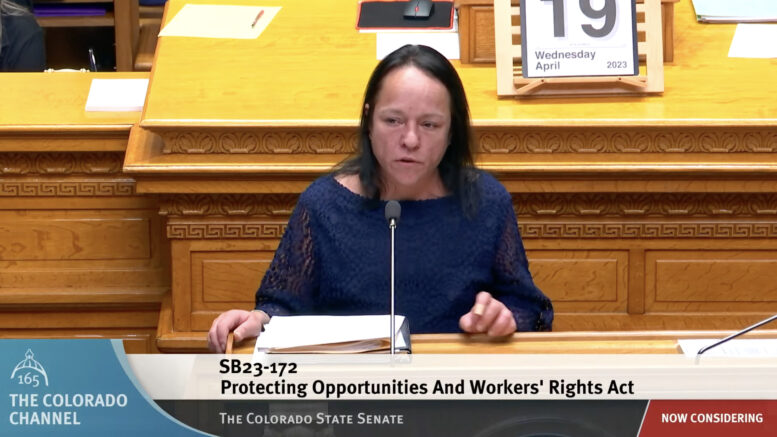Gov. Jared Polis on Tuesday signed into law a bill that redefines harassment in Colorado — the conclusion of a five-day period in which he inked four new workplace regulations, three of which received significant changes through negotiations during the legislative session.
The story of continuing regulatory increases was one that played out again in 2023, much like it has since Democrats won control over the House, Senate and governor’s office in 2019. This year, however, business leaders working in conjunction with legislators were able to transform a potentially seismic bill and several others that could hamper employers’ operational abilities into laws with smaller impacts that still protect workers.
Foremost among the proposals with far-ranging impacts was Senate Bill 172, the Protecting Opportunities and Workers’ Rights (POWR) Act that returned after being defeated in 2021 and failing to get introduced in 2022 because of an impasse in negotiations. Co-sponsored again by Democratic Sen. Faith Winter of Westminster, the bill sought to broaden the definition of harassment beyond the standard of “severe or pervasive” behavior accepted by courts and to make it harder for employers to claim an affirmative defense.
POWR Act evolves
Changes made in the Senate Judiciary Committee and on the Senate floor first provided a more specific definition of harassment than the original bill’s proposal of behavior that was “offensive to a reasonable person in the same actual or perceived protected class.” The reworded bill defines it as behavior that is “subjectively offensive to the individual alleging harassment and is reasonably offensive to an individual who is a member of the same protected class,” specifying that “petty slights, minor annoyances and lack of good manners” aren’t harassment.
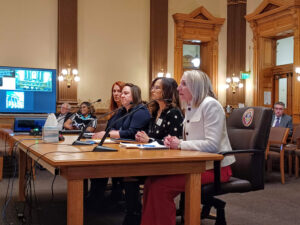
A panel featuring (L to R) Special District Association of Colorado General Counsel Diane Criswell, Sherman & Howard Attorney Brooke Colaizzi, Special District Association Executive Director Ann Terry and Colorado Chamber of Commerce President/CEO Loren Furman testifies against the POWR Act before the Senate Judiciary Committee.
And while the bill still tightens what companies must do to claim an affirmative defense, in which one can introduce facts that justify their conduct as an employer, the requirements in the final bill aren’t as onerous as they were when introduced. Amendments removed provisions that employers must keep written records of oral complaints to state such a defense and that the required maintenance of a repository of all complaints would be tied to that defense.
While SB 172 may result in an increase in legal actions against employers for harassment — an outcome that bill sponsors seek to enable to protect workers from corrosive atmospheres — it isn’t likely to open a floodgate of lawsuits, legal experts and some legislators said.
“I’m very impressed with the process this has gone through, particularly the affirmative defense,” Rep. Marc Snyder, D-Manitou Springs, said during an April 25 House Judiciary Committee hearing. “I think there is a reasonable carrot here for employers to use to get ahead of trouble.”
“We are all harmed”
Still, sponsors said that updating the 35-year-old “severe or pervasive” standard that they considered outdated and too lenient will make an enormous difference for workers subjected to unbearable conditions. In motioning on May 2 to concur with a small technical change to the bill made by the House and move the POWR Act to Polis’ desk, Winter called it “a motion that I’ve been waiting to make for four years.”
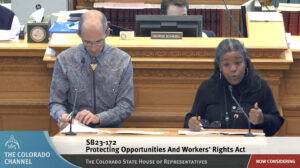
Colorado state Reps. Mike Weissman and Jennifer Bacon discuss the POWR Act they co-sponsored in the House.
“When people can’t go into a workplace and give everything they have, use their talents and gifts to the workplace … because there are biases that can’t get corrected by the law, then obviously that person loses,” co-sponsoring Rep. Mike Weissman, D-Aurora, said during the judiciary committee hearing. “We are all harmed as well when we lose the opportunity, the creative spark when somebody cannot bring it to the workplace.”
On Friday, the Democratic governor signed two other bills to boost employee rights after business and local-government officials worked to fix what they considered to be problematic provisions in those bills.
Other workplace regulations
SB 58 bars employers from asking about a job seeker’s birthdate or other age-identifying information on an initial application — an effort from Democratic Sens. Jessie Danielson and Sonya Jaquez Lewis to combat discrimination against older or younger workers. The Colorado Municipal League led a push to let employers require applicants to submit needed degrees or credentials if those applicants could redact dates on those credentials, and most business groups offered little resistance once that amendment passed.
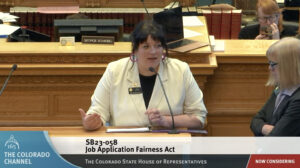
Colorado state Rep. Jenny Willford speaks about Senate Bill 58 in the House while her co-sponsor, Rep. Mary Young, looks on.
SB 17, another Winter bill, expands employees’ allowable uses for state-mandated paid sick leave to include caring for kids whose schools are closed for bad weather or power outages, evacuating residences during natural disasters and dealing with the death of a family member. Business leaders didn’t push for changes to the substance of the bill, noting most employers already allow paid leave in such instances, but led the effort to change the source of funding for enforcement of the bill, which originally was slated to be the Employment Support Fund.
The one proposed employment regulation that legislators did little to adjust was SB 105, an update to the Equal Pay for Equal Work Act that was passed in 2019 and implemented in 2021 that Polis signed Monday. The original law requires employers to post salary ranges in job advertisements, mandates that they post openings where every worker can see them and bars companies from asking about applicants’ past salaries as a way to stop historical underpayment of female employees.
Equal Pay issues
After roughly 100 national employers advertising remote jobs in 2021 posted that Coloradans need not apply in order to get around provisions of the law, business leaders asked Polis and sponsors for changes like exemptions for companies with no physical presence in this state. However, SB 105 did little to roll back requirements of the law, allowing only that out-of-state employers don’t have to notify Colorado workers of job openings unless the jobs can be done remotely, and it doubled from three to six years the amount of back pay that employers violating the law can be required to reimburse.
Danielson, also a co-sponsor of SB 105, said in a release that it, like other workplace regulations, is meant to protect workers with less power than unscrupulous bosses.
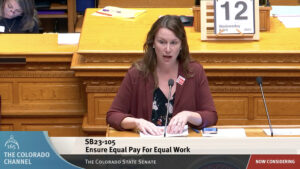
Colorado state Sen. Jessie Danielson speaks in April for her proposed update to the Equal Pay for Equal Work law.
“Nobody should be paid less than their peers for doing the same work — but for too many women in Colorado, that is still the case,” the Wheat Ridge Democrat said in a news release. “We fought to address this inequity through the Equal Pay for Equal Work Act, and this measure will build on that success.”
Colorado Chamber of Commerce President/CEO Loren Furman characterized the 2023 session as one that produced mixed results on workplace regulations. She lauded the compromise on the POWR Act but said she remains disappointed around the lack of consensus on the pay-equity law.
“After three years of working on a balance on workplace harassment legislation, we believe that balance was achieved this session after extensive work by our employment-law experts,” Furman said. “However, other employment laws, including Equal Pay for Equal Work, will continue to create compliance challenges for Colorado employers and for workers seeking remote-work opportunities.”
